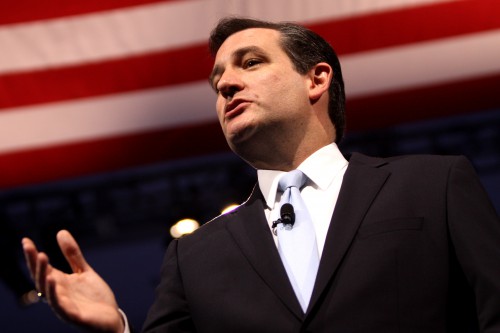By Ian Kea
Texas Senator Ted Cruz on March 23 announced before a crowd at Liberty University in Lynchburg, Virginia his intention to seek the Republican nomination for president. The Canadian-born U.S. legislator is the first major candidate to officially enter the presidential arena on both sides of the aisle.
Although Cruz is the first to set sail on his presidential candidacy, he has many obstacles in his way to become a legitimate contender in his own party.
Cruz, much like former Arkansas Governor and former presidential candidate Mike Huckabee, is running on a heavily conservative, Christian-values platform. Cruz’s supporters are primarily Christian, religious voters, according to CBS News. Because this is a limited group of potential voters, he has a lot of ground to make up and a lot of support to gain if he wants to contend.
In a Politico survey of GOP insiders, including lobbyists, activists and party leaders, not even one of the 100 respondents believed Cruz would be able to win the Iowa Caucus or the New Hampshire primary if the events took place this week. In a Quinnipiac University poll regarding the Iowa Caucus, only five percent of likely Republicans would have Cruz as their first choice. His chances in New Hampshire don’t seem any better. In the Granite State, he polls at less than 4 percent, according to a University of New Hampshire poll.

By Flickr user Gage Skidmore
Cruz is also having problems within his own party, where he is known to be a polarizing figure. He made a name for himself in 2013 when he filibustered the Affordable Care Act for more than 21 hours on the Senate floor. His filibustering tactics helped contribute to the government’s shutdown in October 2013, which has made him more infamous than electable.
However, Cruz told the Des Moines Register he would “presumably” sign up for health care under the ACA after his wife left Goldman Sachs, a move that led leaders of both parties to call him a hypocrite, according to Politico.
Another downfall of Cruz is the circumstances of his own birth. Born in Calgary, Alberta, Canada, Cruz will have trouble gaining votes and swaying undecided Republicans outside his conservative Christian base. Although Cruz’s legal team has said he is eligible to run, he faces much scrutiny. Cruz has even been criticized by Donald Trump, a large Republican donor. Trump believes the circumstances of Cruz’s birth won’t allow him to run and he will eventually face problems with the court system over the issue, according to Bloomberg Politics.
However, despite the odds, Cruz still has a reason for hope, especially when it comes to the Iowa where the Presidential race starts off. In 2008, Huckabee claimed victory in Iowa against insurmountable odds pulling together not only his main Christian voter base but also reeling in undecided Republican voters when it came to his views on the U.S. economy.
Cruz is polling at only one percent in socially conservative South Carolina, according to Politico, making his chances seem even slimmer. His socially conservative views will not appeal to young voters and the undecided, more fiscally-minded Republicans.
The only chance Cruz has now is to focus on economic issues. Otherwise he might as well start putting out his resume.











